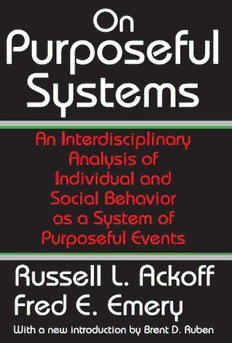
On Purposeful Systems: An Interdisciplinary Analysis of Individual and Social Behavior as a System of Purposeful Events PDF
Preview On Purposeful Systems: An Interdisciplinary Analysis of Individual and Social Behavior as a System of Purposeful Events
On Purposeful Systems nO Purposeful Systems nA Interdisciplinary Analysis of Individual and Social Behavior as a System of Purposeful Events llessuR .L ffokcA derF .E yremE With a new introduction 1,1b Brent .D Auben ~~~~~!!:~~:up LONDON AND NEW KRDY First published 2006 by Transaction Publishers Published 2017 by Routledge 2 Park Square, Milton Park, Abingdon, Oxon OX14 4RN 711 Third Avenue, New York, NY 10017, USA Routledge is an imprint of the Taylor & Francis Group, an informa business Copyright @ 2006 by Taylor & Francis. Copyright @ 1972 by Russell L. Ackoff and Fred E. Emery. All rights reserved. No part of this book may be reprinted or reproduced or utilised in any form or by any electronic, mechanical, or other means, now known or hereafter invented, including photocopying and recording, or in any information storage or retrieval system, without permission in writing from the publishers. Notice: Product or corporate names may be trademarks or registered trademarks, and are used only for identification and explanation without intent to infringe. Library of Congress Catalog Number: 2005054854 Library of Congress Cataloging-in-Publication Data Ackoff, Russell Lincoln, 1919 On purposeful systems: an interdisciplinary analysis of individual and social behavior as a system of purposeful events / Russell L. Ackoff & Fred E.Emery; with a new introduction by Brent D. Ruben. p.cm. Originally published: London: Tavistock Publications, 1972. Includes bibliographical references and indexes. ISBN 0-202-30798-0 (pbk. : alk. paper) 1.Social sciences—Methodology. 2. Social systems. I. Emery, F. E. (Frederick Edmund) II. Title. H61.A38 2006 302.3-dc22 2005054854 ISBN 13: 978-0-202-30798-5 (pbk) To E. A. Singer, Jr., Thomas A. Cowan, and C. West Churchman, who gave us the material to work with. Contents AldineTransaction Introduction ix Preface xiii I. Foundations 1. On Human Behavior as a System 3 2. Structure, Function, and Purpose 13 3. The Individuality of Psychological Systems 33 11. The Process of Pursuing Purposes 63 4. Generation of Inputs: Perception, Consciousness, and Memory 65 5. Modeling the Situation: Beliefs 79 6. Evaluating the Situation: Feelings and Attitudes 100 7. Formulation and Evaluation of Choices: Thought and Intuition 108 8. Purposeful Systems and their Environments 117 Conclusion to Part II: A Paradigm for Inquiry 133 Ill. Interactions of Purposeful Systems 137 9. Feelings and Communication 139 10. Signs, Messages, and Language 160 11. Models of Communication 179 12. Conflict, Cooperation, and Competition 196 IV. Social Systems and Beyond 209 13. Social Groups as Systems 211 14. Ideal-Seeking Systems 237 Contents 15. Epilogue: Rounding the Conceptual Circle 248 Appendix I. 265 Appendix 11. 268 Appendix Ill. 274 Name Index 281 Subject Index 284 AldineTransaction Introduction To have written a book that colleagues would want to read, let alone reissue, some thirty-five years after its original publication is an enviable accomplishment to say the very least. And so it is with On Purposeful Systems. First published in 1972 by Tavistock Publications, this landmark work by Russell L. Ackoff and Fred E. Emery helped to provide the foundation for the area that is traditionally referred to as general systems theory. Along with notable scholars like Ludwig von Bertalanffy, Norbert Wiener, C. West Churchman, Magorah Maruyama, James G. Miller, and Anatol Rapaport, Ackoff and Emery contributed to the articulation of a more integrative way of thinking about and studying the universe. The systems para- digm advanced a framework that focused on commonalities in structure and pro- cess. In so doing, it offered concepts that transcended and unified diverse disciplines and the phenomena upon which they focus. With a generic focus on concepts such as organization, communication, relationship, wholeness, and pur- pose, systems theory at once spanned and linked the study of atoms and galaxies, cells and higher order organisms, individuals and societies. Systems theorists offered a formidable challenge to the accepted views of cau- sality, which emphasized the search for causal linkages, where independent and dependent variables were linked in linear—“the former causes the latter”—se- quences. Alternative explanations emphasized the possibility of the dynamic in- terplay of variables in mutually-causal, deviation-reducing, and/or deviation-amplifying relationships, where no linear sequences are discernible, and indeed, questioning the very premise on which the search for linear sequences is based. In its more orthodox form, classical systems theory was a search for isomorphies— identities—in process and structure across multiple levels and domains. Often, it was the goal of these approaches to represent these universals with mathematical or formulaic models. In its more liberal applications, systems theory was charac- terized by the pursuit of analogies and similarities in structure and process that ix
